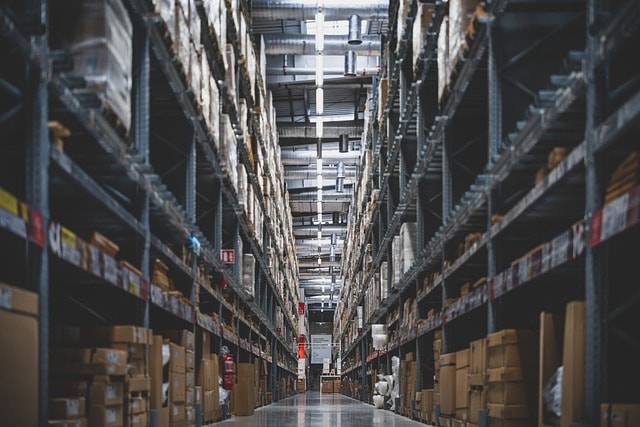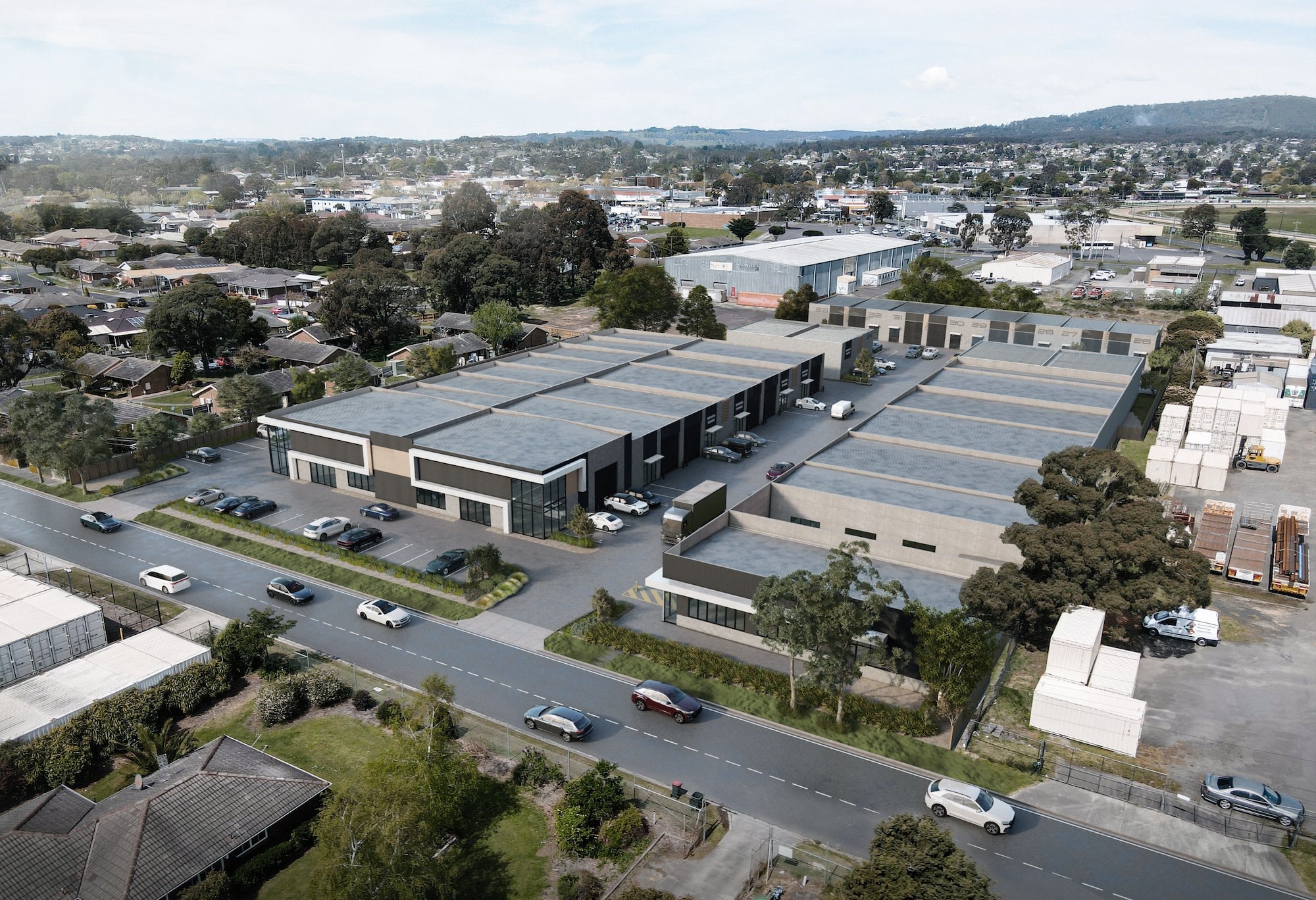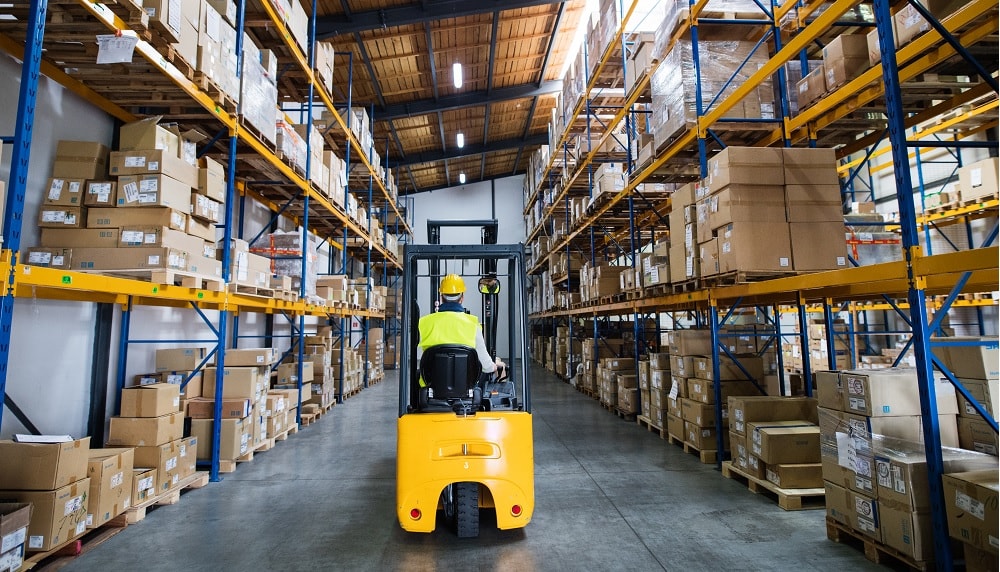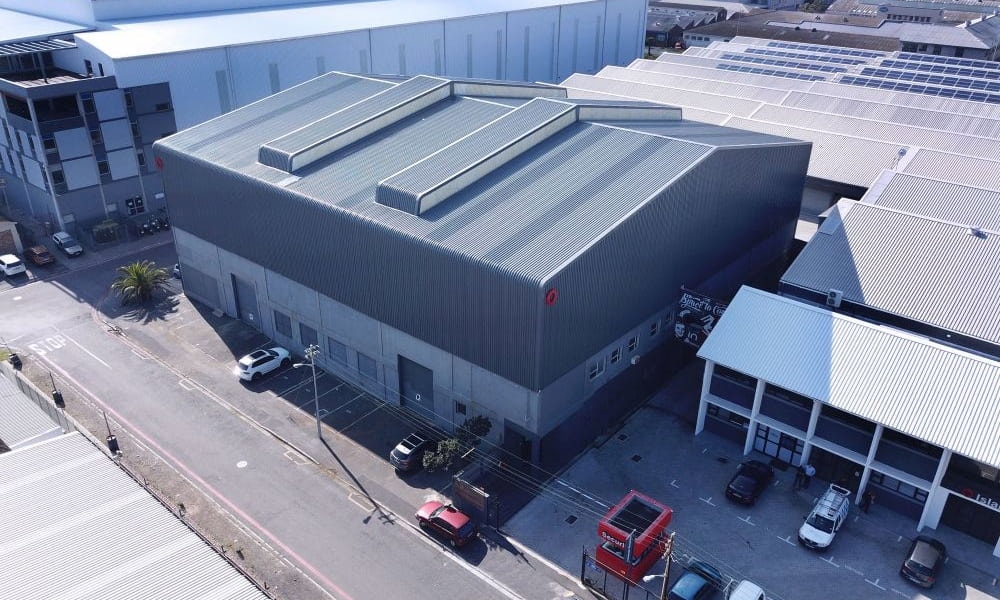As a seasoned business finance broker, many business owners ask my opinion on whether buying a warehouse is a good investment in Australia.
With the growth of e-commerce and the ever increasing need for storage and distribution centres, industrial warehouses are coming into focus for a lot of people. In this article I’ll go into the pros and cons of warehouse investment, the Australian market and give you the tools to make a decision.

Understanding Warehouse Properties
First let’s have a look at the types of properties you can invest in.
Warehouse properties are a vital segment of commercial real estate, primarily used for storing goods, products, and equipment. These properties can vary significantly in size and complexity, ranging from small, single-story buildings to expansive, multi-story facilities equipped with advanced security systems and climate control. The versatility of warehouse spaces makes them suitable for various purposes, including storage, distribution, manufacturing, and logistics.
if you’re considering investing in a warehouse property, it’s essential you understand the different types of warehouses and their unique characteristics. For instance, a Class A warehouse is a high-end facility featuring advanced amenities such as high ceilings, multiple dock doors, and comprehensive sprinkler systems. These properties are typically newer and located in prime industrial areas. In contrast, a Class C warehouse is a more basic facility, often older, with lower ceilings and fewer amenities, but can still be a valuable investment depending on the market demand and location.
It’s important for you to understand the local market and the elements that affect demand for warehouse space – this is crucial when evaluating a warehouse property. Factors such as location, accessibility to major transport routes, and zoning regulations can significantly impact the property’s value and investment potential over time. You need to thoroughly research these aspects so you can make informed decisions, and understand the factors that contribute to a lucrative warehouse investment opportunity.
The Australian Commercial Real Estate Warehouse Market
Before we get into the details of warehouse investment let’s look at the current state of the Australian warehouse market. According to a CBRE report the industrial and logistics sector in Australia has seen massive growth in recent years with vacancy rates at record lows and rental growth at an all time high.
The continued shift to online shopping is also more prevalent than ever. As a result, the warehouse demand driven by the need for more space for manufacturing, storage, and distribution has gone through the roof. In fact the National Australia Bank (NAB) predicts online retail will account for 14.6% of total retail sales by 2025 up from 11.1% in 2020.
This growth in demand has led to increased investment in the sector. The Australian Financial Review reported that in 2020 industrial property transactions reached a record $13.5 billion with warehouses making up a big chunk of those deals.

Why Buy a Warehouse?
Benefit |
Details |
|---|---|
Strong and Stable Returns |
Warehouses offer the potential for strong and stable returns. According to Savills Research, prime industrial yields in Australia’s major cities ranged from 4.25% to 5.50% in 2021, outperforming many other commercial property types. |
Long-Term Leases |
Warehouses often come with long-term leases, providing investors with a steady income stream. 5-10 year leases are common, especially for larger purpose-built facilities. |
Lower Maintenance Costs |
Compared to office buildings or retail spaces, warehouses generally have lower maintenance costs. Their simple functional design means fewer complex systems to maintain and repair. |
Flexibility and Adaptability |
Warehouses can be adapted for many industries and purposes, from e-commerce fulfilment centres to cold storage facilities, making them attractive to a wide range of tenants. |
Potential for Capital Growth |
As demand for industrial space grows, so does the potential for capital appreciation. Well-located warehouses in key logistics hubs can see significant increases in value over time. |
Important Considerations
While buying a warehouse can be a good investment it’s not without its challenges. Here are some to consider:
Challenge |
Details |
|---|---|
High Upfront Costs |
Warehouses come with a big price tag, especially in prime locations. According to Colliers International, prime industrial land values in Sydney were $1,585 per square metre in 2021, making it one of the most expensive in Australia. |
Location is Key |
The success of a warehouse investment is heavily dependent on location. Proximity to major transport routes, ports, and urban centres is essential for attracting quality tenants. |
Technology Changing |
Rapid advancements in automation and robotics may require warehouse owners to invest in upgrades to remain competitive. |
Economic Sensitivity |
While generally stable, the industrial property sector can be impacted by economic downturns, particularly those affecting manufacturing and retail. |
Zoning and Regulation |
Warehouse investments may face zoning restrictions and environmental regulations, which can limit future development or use of the property. |

Due Diligence for Warehouse Investment
Due diligence is a critical step in the warehouse investment process, ensuring that investors make informed decisions and avoid potential pitfalls. Here are some key factors to consider when conducting due diligence on a warehouse property:
-
Location: The property’s location is paramount. Ensure it is situated in a desirable area with excellent access to transportation routes, ports, and urban centers. Proximity to these amenities can attract quality tenants and enhance the property’s value.
-
Condition: Assess the property’s condition, including its age, maintenance history, and any necessary repairs. A well-maintained warehouse can reduce future maintenance costs and attract long-term tenants.
-
Zoning: Investigate any zoning restrictions or regulations that could impact the property’s use. Understanding these regulations can help you avoid legal issues and ensure the property meets your investment goals.
-
Market Demand: Analyze the demand for warehouse space in the area. High demand can lead to better rental yields and lower vacancy rates. Look for potential tenants or buyers to gauge the property’s marketability.
-
Financials: Review the property’s financials, including its income, expenses, and potential for appreciation. Understanding the financial health of the property can help you make a sound investment decision.
Conducting thorough due diligence can provide valuable insights and help investors mitigate risks, ensuring a successful warehouse investment.
Things to Consider When Buying a Warehouse
If you’re serious about buying a warehouse as an investment, especially as industrial property investors are increasingly interested in this market, here are some things to think about:
-
Location: As mentioned earlier, location is key. Look for warehouses in established industrial areas with good transport links.
-
Size and Specifications: Consider the size and specifications of the warehouse. Ceiling height, loading docks, and floor load capacity are all important factors that can impact the property’s versatility and appeal to potential tenants.
-
Tenant: If the warehouse is already leased, assess the quality of the tenant. A long-term lease with a good tenant can add significant stability to the investment.
-
Future Development: Look for properties with future development potential. This could be excess land or the ability to add mezzanine levels.
-
Energy Efficiency: With the growing focus on sustainability, energy-efficient warehouses are becoming more attractive to tenants. Features like solar panels or efficient lighting systems can be a big selling point.
-
Market Trends: Keep an eye on market trends in the industrial sector. For example, the rise of last-mile delivery hubs in urban areas could be new opportunities for smaller warehouse investments.

Operating Expenses and Maintenance Costs
Operating expenses and maintenance costs are essential considerations when investing in a warehouse property. These costs can significantly impact the overall profitability of your investment. Here are some key expenses to keep in mind:
-
Property Taxes: The annual taxes owed on the property can vary depending on its location and assessed value. It’s crucial to factor these costs into your budget.
-
Insurance: Insuring the property against damage or loss is vital. Insurance costs can vary based on the property’s location, size, and usage.
-
Maintenance: Regular maintenance is necessary to keep the property in good condition. This includes repairs, replacements, and upgrades to ensure the warehouse remains functional and attractive to tenants.
-
Utilities: The cost of utilities such as electricity, water, and gas can vary depending on the property’s size and usage. Efficient energy management can help reduce these costs.
-
Property Management: Hiring a property manager or management company can help oversee the day-to-day operations of the warehouse. This includes handling tenant relations, maintenance, and financial management.
Understanding these costs can help investors budget effectively and plan for the ongoing expenses associated with owning a warehouse property, ensuring a stable and profitable investment.
Funding Your Warehouse Purchase
One of the most important parts of buying a warehouse, a key type of industrial real estate, is getting the right funding. Commercial property loans for warehouses are different to residential mortgages in many ways:
-
Higher Deposit: Lenders require a bigger deposit for commercial properties. While residential loans may allow 5-10% deposit residential loans commercial loans require 20-30% or more.
-
Shorter Loan Terms: Commercial property loans are shorter than residential mortgages. While you may get a 30 year term for a home loan commercial loans are 10-15 years.
-
Different Interest Rates: Interest rates for commercial properties are generally higher than residential rates. However they can vary significantly depending on the location of the property, your financial situation and the lender’s assessment of the investment.
-
Stricter Lending Criteria: Banks and lenders have stricter criteria for commercial loans. They will scrutinise the property’s potential income, your business plan and your financial history.
Use this calculator to get an idea of what your monthly repayments might be when buying a warehouse.
Warehouse Loan Repayment Calculator
This is a rough calculation only and doesn’t take into account fees, taxes or changes in interest rates over time. Always consult a financial advisor or mortgage broker for a more accurate assessment of your situation.
Managing a Warehouse Investment
Managing a warehouse investment requires ongoing attention and strategic planning. Here are some key factors to consider for effective management:
-
Property Management: Hiring a professional property manager or management company can streamline the day-to-day operations of the warehouse. They can handle tenant relations, maintenance, and financial management, allowing you to focus on other aspects of your investment portfolio.
-
Tenant Relations: Building strong relationships with tenants is crucial for maintaining a positive and productive working environment. Happy tenants are more likely to renew leases and take good care of the property.
-
Maintenance and Repairs: Regular maintenance and timely repairs can prevent costly problems and extend the property’s lifespan. A proactive approach to maintenance can also enhance the property’s appeal to potential tenants.
-
Marketing and Leasing: Effective marketing and leasing strategies can help attract and retain tenants, maximizing rental income. Highlighting the property’s features and benefits can make it stand out in a competitive market.
-
Financial Management: Ongoing financial management, including budgeting and accounting, is essential for tracking expenses and income. This helps investors make informed decisions and optimize the property’s profitability.
By following these tips, investors can effectively manage their warehouse investment, ensuring it remains a valuable and profitable asset in their commercial real estate portfolio.

Case Study: Warehouse Investment Opportunities in Melbourne
Here’s a real life example of a warehouse investment. In 2018 a group of investors purchased a 10,000 sqm warehouse in Laverton North, Melbourne for $11.5m. At the time of purchase the property was leased to a national logistics company with 5 years remaining on the lease.
Over the next 3 years the investors made several improvements to the property:
-
Upgraded the lighting to energy efficient LED systems
-
Installed solar panels on the roof
-
Improved the loading dock area to accommodate larger vehicles
These improvements not only reduced costs but also made the property more attractive to tenants. When the original lease expired in 2023 the investors were able to negotiate a new 10 year lease with a major e-commerce company at 15% higher rent.
As of 2024 the property is worth $16.2m, a 40% increase in 6 years. Plus the steady rent, this investment has given the owners a great return on their initial investment.
This case study shows the potential for capital growth and rental yields in the warehouse sector if you take a proactive approach to property management and improvement, especially considering the growing tenant demand.
Is Buying a Warehouse a Good Investment?
After all the above, the answer is… it depends.
For the right person, with the right property, in the right location, a warehouse can be a great investment. Strong, stable returns, long term leases and capital growth make warehouse real estate a good option in the current market.
But you need to approach warehouse investments with caution and due diligence. The high initial purchase price, location and potential for disruption in the logistics sector are challenges to be considered.
Before you invest in a warehouse consider the following:
-
Research the Market: Stay up to date with industrial property trends in your target area. Resources like the Property Council of Australia and commercial real estate firms like CBRE and Colliers International have great market information.
-
Consult with Experts: Talk to commercial real estate agents, property lawyers and financial advisors who specialise in industrial property investments.
-
Assess Your Situation: Use the calculator above to get an idea of the costs involved. Don’t forget to factor in additional expenses like maintenance, insurance and potential vacancies.
-
Consider Your Goals: Think about how a warehouse investment fits into your overall investment strategy and long term financial goals.
-
Explore Options: Look into different types of warehouse investments, single tenant properties to multi-unit industrial estates.
In the end buying a warehouse can be a good investment for those who are prepared, have the funds and ready to take on the industrial property sector. As with any big investment, research and due diligence is key to making a good decision.
Remember the property market is unpredictable and past performance is no guarantee of future results. Always seek professional advice before making any big decisions.

Conclusion
Investing in a warehouse property can be a lucrative opportunity for commercial real estate investors. By understanding the different types of warehouses, conducting thorough due diligence, and managing the property effectively, you can maximise your potential returns and achieve your investment goals. Whether you’re a seasoned investor or just starting out, warehouse properties offer a unique combination of income potential, appreciation, and tax benefits that make them an attractive addition to any commercial real estate portfolio.
That said, warehouse investing requires careful planning, research, and management. By staying informed about market trends, consulting with experts, and assessing your financial situation, you can make sound investment decisions and capitalize on the growing demand for warehouse space. Remember, the property market is unpredictable, and past performance is no guarantee of future results. Always seek professional advice before making any significant investment decisions.

